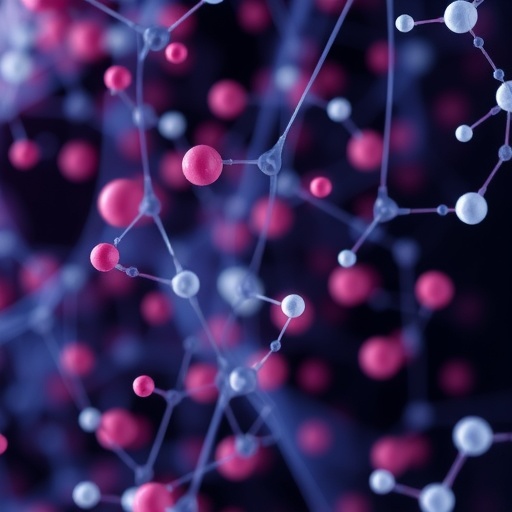In a groundbreaking study published in BMC Genomics, an international team of researchers, led by Gao et al., delves into the increasingly critical field of proteomics to uncover a distinct signature associated with aging. Their research primarily focuses on the analysis of bloodstain samples, a novel approach that showcases the potential of non-invasive biological markers in understanding the aging process. This study not only contributes to the existing body of knowledge regarding age-related changes in human physiology but also opens new avenues for early detection and transformative healthcare interventions aimed at enhancing longevity.
The researchers adopted a high-throughput proteomic analysis, leveraging advanced technologies such as mass spectrometry, to profile the protein expressions in blood samples collected from different age groups. By comparing the proteomic profiles, the team identified notable differences in protein abundance that correlate with biological aging. This robust methodology enhances the reliability of their findings, offering insights into the nuanced biochemical pathways that may underlie age-associated diseases.
As the global population ages, understanding the molecular underpinnings of aging becomes more pressing than ever. The findings from this study could be pivotal in developing biomarkers for age-related conditions, such as cardiovascular diseases, neurodegenerative disorders, and metabolic syndromes. Moreover, these biomarkers can serve as targets for therapeutic strategies that may slow down the progression of aging and enhance quality of life in older adults.
One of the significant contributions of this research is its emphasis on accessibility and feasibility. By analyzing bloodstains—samples that can be collected with minimal discomfort—the research paves the way for broader screening and monitoring of age-related health markers without the need for invasive procedures. This could lead to a paradigm shift in how we approach preventive healthcare, moving towards a model that emphasizes early intervention based on individual biological profiles.
The study also sheds light on the complexity of the aging process. The researchers have identified several proteins that not only serve as markers of aging but also play critical roles in cellular processes such as inflammation, oxidative stress response, and metabolic regulation. This multifaceted approach allows for a richer understanding of how aging manifests at the molecular level and underscores the importance of a comprehensive view of health in aging populations.
With the advent of personalized medicine, the implications of this research extend beyond academic interest. By understanding an individual’s unique proteomic signature, healthcare providers may tailor interventions that specifically address the needs of aging individuals. This could include bespoke nutritional plans, physical activity regimens, and targeted supplementation, all aimed at enhancing healthspan rather than just lifespan.
Another noteworthy aspect of the study is its potential for integration with other omics technologies, such as genomics and metabolomics. This holistic approach to studying aging could unveil a more intricate web of interactions between genes, proteins, and metabolites, providing a dynamic framework for exploring age-related changes in health. Such interdisciplinary collaboration is crucial for addressing the complexities of human health and disease.
The researchers are also keenly aware of the ethical implications of their findings. As proteomics technology becomes more advanced, concerns regarding data privacy, the misuse of genetic information, and the potential for discrimination in insurance and employment must be addressed. Engaging with these ethical dimensions is paramount to ensuring that scientific advancements in aging research translate into positive outcomes for society.
Furthermore, this study has implications beyond human health; it can also influence research in animal models of aging. The methodologies and findings may assist in creating benchmarks for comparative analyses, leading to improved understanding of aging across species. This cross-species perspective could further enrich the development of interventions that promote longevity and vitality.
The preliminary nature of the study suggests that further research is essential to validate the proteomic signatures identified in this investigation. The team hopes to expand their sample size and explore additional demographics to ensure that their conclusions are generalizable across different populations. This line of inquiry may ultimately culminate in a comprehensive proteomic atlas of aging, serving as an invaluable resource for future studies.
In the context of rapidly advancing technologies, the practical application of the study’s findings could revolutionize routine health assessments. Early detection of aging-related changes could enable timely interventions, potentially lowering healthcare costs related to chronic diseases and improving overall population health. The consequences of such advancements could have far-reaching effects on healthcare systems strained by aging populations.
The authors express optimism about the future of aging research, emphasizing the potential for continued innovation in proteomic technologies. As analytical capabilities become more refined, the resolution with which scientists can discern age-related changes in protein expression will only improve, leading to an ever-deepening understanding of the biology of aging.
In summary, Gao et al.’s research represents a significant leap forward in the field of aging research through its focus on proteomic signatures in bloodstain samples. This exploratory study not only advances scientific understanding but also holds promise for practical applications in healthcare and personalized medicine. The multidisciplinary collaboration, innovative methodologies, and ethical considerations woven throughout this research exemplify the forward-thinking approach required to tackle the challenges presented by an aging global population.
As the world continues to grapple with the implications of increasing longevity, studies like this remind us of the power of science to improve quality of life. Future investigations that build upon these findings will undoubtedly lead us closer to unraveling the many mysteries of aging and, ultimately, to unlocking the secrets of a healthier, longer life for all.
Subject of Research: Proteomic signature of aging in bloodstain samples
Article Title: Proteomic signature of aging in bloodstain samples: a preliminary study
Article References: Gao, N., Yu, D., Xu, J. et al. Proteomic signature of aging in bloodstain samples: a preliminary study. BMC Genomics 26, 970 (2025). https://doi.org/10.1186/s12864-025-12164-x
Image Credits: AI Generated
DOI:
Keywords: Aging, proteomics, bloodstain samples, biomarkers, healthspan, mass spectrometry, personalized medicine, ethical considerations.
Tags: age-related diseases researchaging biomarkersbiochemical pathways in agingblood proteomicsearly detection of aginghigh-throughput proteomic analysislongevity and healthspanmass spectrometry in proteomicsmolecular mechanisms of agingnon-invasive biological markersprotein abundance in agingtransformative healthcare interventions





